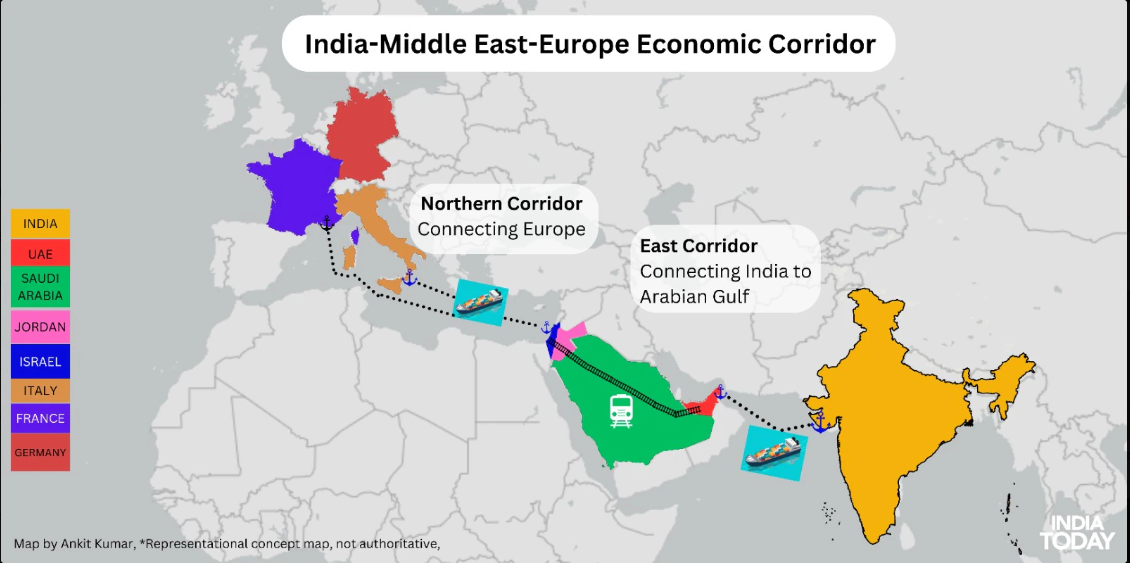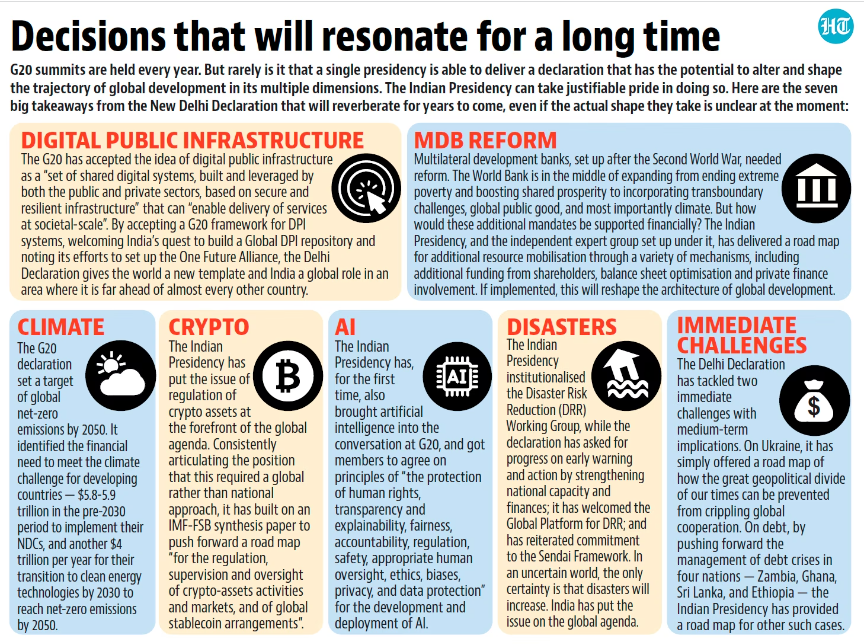ForumIAS announcing GS Foundation Program for UPSC CSE 2025-26 from 19 April. Click Here for more information.
Contents
- 1 1.Inclusion of African Union (AU) as a permanent G20 member.
- 2 2.Launch of India-Middle East-Europe Corridor (IMEC)
- 3 3.Launch of Global Biofuel Alliance (GBA)
- 4 4.Launch of One Future Alliance and Creation of a Global Digital Public Infrastructure Repository
- 5 5.Progress on climate change
- 6 New Delhi Declaration
- 7 Conclusion
| For 7PM Editorial Archives click HERE → |
Recently 18th G20 summit 2023 concluded in India with the conclusion of final meeting of the ‘Head of States’ in New Delhi. The summit under India’s presidency was a historic success. It ended with the adoption of New Delhi Declaration which was adopted with 100% consensus. This is a huge diplomatic win for India considering the stance taken on Ukraine Crisis was agreed upon by both Russia and China. The summit saw several new global initiatives which were launched which will change the global landscape.
Read More- Delhi Declaration PDF
This article focuses on major outcomes of G20 which have lot of geopolitical and geoeconomic importance.
G20 summit 2023 outcomes
1.Inclusion of African Union (AU) as a permanent G20 member.
Geo-Political Significance
G20 to become more representative – The 55-member African Union was formally made permanent member of the G20 in order to make the grouping more representative. AU has been put on par with the European Union (EU).
Voice to the Global South – The entry of the AU would provide greater voice to the Global South within the G20 where the G7 countries have long played a dominant role.
India as the leader of Global South – African Union’s (AU) inclusion in the Delhi summit reinforced India’s position as the leader of Global South.
Fresh Momentum to India-Africa Relationship – India’s Africa outreach has witnessed several crests and troughs over the decades. Inclusion of AU is a crest for Indian diplomacy which must harness this opportunity and build upon a stronger India-Africa Relationship.
Geo-Economic Significance
Africa as the next Global Growth Hub – Inclusion of African Union (AU) in the G20 addresses the economic imbalance in the representation of G20. Africa is the next Global Growth Hub. AU makes G20 more representative.
Africa as hub of natural resources- Africa is a reservoir of natural resources. DR Congo is endowed with cobalt; Morocco has the largest phosphate reserve in the world and Nigerian gas can power all Europe. These resources must be harnessed in a judicious manner to power next gen climate friendly technologies like e-battery and e-vehicles.
Possible Challenges-
Difficulties in reaching consensus- With the G20 now becoming G21 there is possibility of sharpening of ideological divide between the west and global south on issues of global common like funds for climate change mitigation with AU representing the voice of 55 African countries collectively.
Rise of Chinese Influence- China having made massive investments in the African countries can use AU to act in its interest on contentious issues.
2.Launch of India-Middle East-Europe Corridor (IMEC)
India-Middle East-Europe corridor aims at establishing railway and sea connectivity between Europe, Middle East and Asia. The project includes India, the UAE, Saudi Arabia, the European Union, France, Italy, Germany and the US. India-Middle East-Europe Corridor is part of the Partnership for Global Infrastructure Investment (PGII) which is a collaborative effort by G7 nations to fund infrastructure projects in developing nations.

Geo-Political Significance
Counter to Chinese Belt and Road Initiative-It is one of the more ambitious counters to China’s massive infrastructure program through which it has sought to connect more of the world to that country’s economy. Belt and Road Initiative (BRI) has created ‘debt trap’ and has diminished the sovereignty of member countries.
Strengthening of G20-The India-Middle East-Europe Corridor project is an attempt to further strengthen the G20 group to counter the dominance of China’s Xi Jinping and Russia’s Vladimir Putin.
Geopolitical Stability in Middle East- The India-Middle East-Europe Corridor project could help reduce turbulence and insecurity coming out of the Middle East due to greater economic integration of Middle Eastern Economies of the UAE, Saudi Arabia, Jordan, Israel, and Europe.
Geo-Economic Significance
Increased Prosperity- India-Middle East-Europe corridor (IMEC) would increase prosperity among the countries involved through an increased flow of energy and digital communications.
Developed Infrastructure- India-Middle East-Europe corridor (IMEC) would help deal with the lack of infrastructure needed for growth in lower and middle-income nations. IMEC will be a green and digital bridge across continents and civilizations as the corridor will include a rail link as well as an electricity cable, a hydrogen pipeline and a high-speed data cable.
Possible Challenges
Implementation on Ground- Early implementation and construction of IMEC is a challenge that member countries face.
Finance-The Corridor would require massive finance for its construction. Arrangement of such funds is a challenge considering the recession that has been creeping in the world economy.
Chinese Resistance-IMEC may face Chinese pushback as China as already invested heavily in BRI project and has been making considerable investments in the middle eastern economies like Iran.
Read More-India-Middle East-Europe corridor (IMEC)
3.Launch of Global Biofuel Alliance (GBA)
Global Biofuels Alliance has been launched by India, Brazil and US which together account for 85% of global Ethanol Production. It will be an international platform for sharing best practices, promoting sustainable biofuel development and enhancing its application.
Significance
Increased Technology transfers- The transfer of technologies and mobilisation of international climate funds through the Global Biofuels Alliance (GBA) will help member countries move faster in the compressed biogas sector and third generation ethanol plant capacities.
Help in achieving higher Blending of petrol with ethanol- Countries like Brazil have achieved E-85 that is 85% blending of biofuel with petrol. Countries can learn from Brazil through this platform of Global Biofuels Alliance (GBA) by adopting their technology.
Aid in fight against climate change- According to International Energy Agency (IEA) global biofuel production needs to be tripled by 2030 to put the world’s energy systems on track to achieve net zero by 2030. GBA will enhance the production and consumption of biofuels which will help in reduction of global Warming.
Decarbonisation of transportation sector- Blending of petrol with ethanol, use of biodiesel and Sustainable Aviation Fuel (SAF) reduces the emissions of greenhouse gases from transportation sector. GBA will promote decarbonisation of transportation sector.
Reduced dependence on OPEC and OPEC+- With increased usage of biofuels in blending dependence on fossil fuels like petrol and diesel is reduced. This reduces dependence of countries on the oil policies of OPEC and OPEC+.GBA will reduce our dependence on these organisations.
Possible Challenges-
Transfer of Technology-US has generally been reluctant to share its technology with other countries. Global Biofuels Alliance (GBA) can also face this problem of ‘technological secrecy’ which may hamper its overall objectives.
Geopolitical contestation-China and Russia have been averse to any platform led by the western countries. Membership expansion may face the ‘Chinese hurdle’ as many countries are under the Chinese debt trap and their foreign policies are dictated by China.
Import restrictions on Biofuels- India has put import restrictions on import of biofuels in its National Biofuels Policy 2018. These import restriction policies are a major challenge for the development of global biofuels market. Global Biofuels Alliance faces a major challenge of removal of these inward-looking policies.
Funds-The funding mechanism needs to be structured and put into place for ensuring sustainable financing of projects. With US experiencing recession and the global institutions like WB, IMF facing resource scarcity funds for Global Biofuels Alliance will be a major challenge.
4.Launch of One Future Alliance and Creation of a Global Digital Public Infrastructure Repository
One Future Alliance is a voluntary initiative aimed at building capacity and provide technical assistance and adequate funding support for implementing digital public infrastructure in low- and middle-income countries. A voluntary and suggested framework for the development, deployment and governance of Digital Public Infrastructure (DPI) has been unanimously accepted by all G20 member countries.
Significance-
Economic Development of Global South- Digital Public Infrastructure (DPI) can be powerful financial inclusion mechanism for the countries of global southern economies.
India as a leader in the digital public infrastructure-The adoption of Indian UPI and India Stack would boost fintech, entrepreneurship and existing businesses. This would enhance India’s leadership role in the global south economies.
Enhancement of Productivity of economies- Adoption of Digital Infrastructure would increase productivity of global south economies with reduction in Incremental Capital Output Ratio (ICOR).
Challenges-
Need for Investment- The creation of digital public infrastructure requires investments which may be difficult for the global economies to pump on their own. This also opens spaces for colonising powers like China who engage in ‘debt trap’ diplomacy.
Need for Data protection laws- Digital Public Infrastructure generates a lot of data which are used by the MNCs as data is the new oil. Global south countries need to have strong data protection laws to prevent themselves from ‘tech colonisation’.
5.Progress on climate change
The G20 leaders agreed to pursue tripling renewable energy capacity globally by 2030 and accepted the need to phase-down unabated coal power.
However, the group did not provide any plan to amend existing policies and targets to achieve the target of ramping of renewables. G20 estimated that $4 trillion a year would be needed to pay for a green energy transition but did not lay out any pathway to it. G20 stopped short of setting major climate goals.
New Delhi Declaration

Read More-New Delhi Declaration
Conclusion
Leadership of the G20 has been a year-long opportunity to showcase India as an influential diplomatic and economic power, and drive investment and trade flows into the world’s most populous country.




